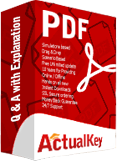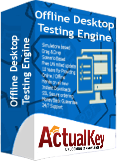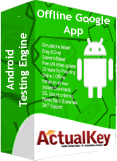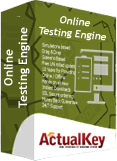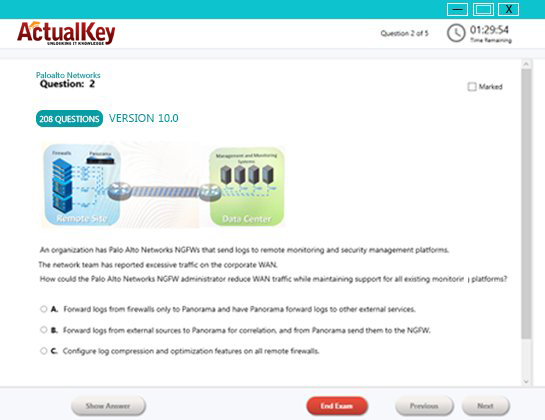Limited Time 30% Discount Offer Use Code - off30
Actualkey Prepration Latest 700-821 : IOTSE Cisco IoT Essentials for System Engineers Questions and Answers PDF's, Verified Answers via Experts - Pass Your Exam For Sure and instant Downloads - "Money Back Guarantee".
| Vendor | Cisco |
| Certification | Cisco Channel Partner Program |
| Exam Code | 700-821 |
| Title | IOTSE Cisco IoT Essentials for System Engineers |
| No Of Questions | 30 |
| Last Updated | September 16,2024 |
| Product Type | Q & A with Explanation |
| Bundel Pack Included | PDF + Offline / Andriod Testing Engine and Simulator |
Exam overview
This exam tests a candidate's knowledge of Cisco’s Industrial Ethernet Switching, Cisco’s Industrial Ethernet Switching Management Options, Cisco’s Industrial Wireless, Cisco Remote and Mobile Assets Hardware, and Cisco Remote and Mobile Assets Software.
Exam topics
The following topics are general guidelines for the content likely to be included on the exam. However, other related topics may also appear on any specific delivery of the exam. To better reflect the contents of the exam and for clarity purposes, the guidelines below may change at any time without notice.
Exam Description:
Cisco IoT Essentials for System Engineers v2.1 (IOTSE 700-821) is a 60-minute exam. This exam tests a candidate's knowledge of Cisco Industrial Ethernet Switching, Cisco Industrial Wireless, Cisco Industrial Routing, and Cisco IoT Operations Dashboard. The course IoT Essentials Technical helps candidates to prepare for this exam.
The following topics are general guidelines for the content likely to be included on the exam. However, other related topics may also appear on any specific delivery of the exam. To better reflect the contents of the exam and for clarity purposes, the guidelines below may change at any time without notice.
30% 1.0 Cisco Industrial Ethernet Switching
1.1 Describe the Industrial Switches Portfolio
1.2 Describe the capabilities of Industrial Switches
1.3 Explain the power supply options for Industrial Switch
1.4 Explain the management options for Industrial Switch
20% 2.0 Cisco Industrial Wireless
2.1 Describe the capabilities of IW6300
2.2 Describe the capabilities of IW9167
2.3 Describe Cisco Ultra-Reliable Wireless Backhaul Solution
25% 3.0 Cisco Industrial Routing
3.1 Describe the Industrial Routing and gateway portfolio
3.2 Explain the functionality of Industrial Routers and Gateways
3.3 Explain the SDWAN support on IR routers
25% 4.0 Cisco IoT Operations Dashboard
4.1 Describe the functionality and architecture of the IoT Operations Dashboard
4.2 Explain Edge Device Manager and how to deploy and manage routers and gateways with EDM
4.3 Describe the architecture of Secure Equipment Access
QUESTION 1
What information can be updated in the Master PM application for an associated Preventive Maintenance record (PM)?
A. Work Order Status
B. PM Forecast
C. Generate Work Orders
D. PM Hierarchy
Answer: B
The PM Forecast field on the Master PM record is used to specify how many days ahead you want to forecast work orders for associated PMs2. This field can be updated in the Master PM application and
affects how many work orders are generated from the associated PMs.
QUESTION 2
When creating a new Inspection form, a client requires a Work Order to be created if certain responses are recorded. Which two actions are required for this to be achieved?
A. Choose Work Order on question action.
B. Make the question response interactive.
C. In Form Settings add an Action Script.
D. In the Question Options, set the Require action flag.
E. Create an escalation on the QRESPONSE Object.
Answer: AD
Explanation:
According to the IBM documentation, you can create inspection forms that detail the questions and types of responses that you want to collect. The inspection forms that you create are then available
to inspectors in the Conduct an Inspection tool. You can also add conditions to the response fields of existing questions on inspection forms to gather more information. You can determine which
additional response fields appear to inspectors, depending on the answers they gave to inspection form questions.
To create a work order based on certain responses, you need to do two things:
Choose Work Order on question action: This option allows you to specify an action that is triggered when a certain response is selected by the inspector. For example, if a question asks -Is there any
damage?-?, and the inspector selects -Yes-?, you can choose Work Order as the action that is triggered by this response. This will create a work order for repairing the damage.
In the Question Options, set the Require action flag: This option allows you to indicate that an action is required for a question. For example, if a question asks -Is there any damage?-?, and you set the
Require action flag to Yes, then the inspector must select a response that triggers an action, such as Work Order or Notification. If they select a response that does not trigger an action, such as -No-? or
-N/A-?, they will see an error message and will not be able to submit the inspection form.
QUESTION 3
In which three applications can Asset Depreciation be configured?
A. Chart of Accounts
B. Tools
C. Asset Templates
D. Locations
E. Assets
F. Item Master
Answer: CDE
Explanation:
Asset Depreciation can be configured in three applications in IBM Maximo Manage v8.0 according to
IBM's documentation. These applications are:
Asset Templates
Assets
Locations
QUESTION 4
How is the Lock Out / Tag Outs application structured?
A. Specify a Lock Out on an Asset with a Locking Device and define the Tag Out Operations.
B. Specify a Lock Out on the Location or Asset and define the Tag Out Operations.
C. Specify a Tag Out on the Location or Asset and define the Lock Out Operations.
D. Define the isolation procedures on a set of related assets and specify a sequence.
Answer: B
Explanation:
In IBM Maximo Manage v8.0 implementation, the Lock Out / Tag Out application is structured such
that you specify a Lock Out on the Location or Asset and define the Tag Out operations. This
application is used to manage the procedures and controls put in place to protect personnel from
injury due to unintended or inadvertent equipment or system operation.
I Got My Success Due To Actualkey 700-821 Bundle Pack Actualkey experts I got passed in the 700-821 exam without any worries at all, these exam material products gave me the reason to relax.
Budi Saptarmat
Yahoo! Got Successfully Through The 700-821 Exam Passing Exam is not a easy thanks to Acutalkey.com for providing me actual 700-821 IOTSE Cisco IoT Essentials for System Engineers training with there included the Offline and Android simulators helps me success
Melinda
700-821 Exam Best Preparation I have been preparing for 700-821 IOTSE Cisco IoT Essentials for System Engineers, I was not sure that I'll be able to pass because of the fact that I am not a good student however;Actualkey.com provided me best and simple exam training pdf's and I passed. I now recommend everyone
Antonio Moreno
Actualkey.com 700-821 Offline Simulator is Best My choice to select Actualkey.com and go for the preparation 700-821 IOTSE Cisco IoT Essentials for System Engineers, because I got the short way with the easy way
Liliane Meichner
Actualkey.com 700-821 Exam PDF"s passed with in a week 700-821 exam pdf's that's amazing
James Wilson
Cisco - RELATED EXAMS
Implementing Cisco Unified Communications Manager Part 2 (CIPT2 v6.0)
Questions: 174 | May 8, 2024
Implementing Cisco Security Monitoring, Analysis andResponse System
Questions: 49 | May 8, 2024
Cisco Wide Area Application Services for System Engineers exam
Questions: 60 | August 1, 2024
Cisco Data Center Networking Infrastructure Solutions design
Questions: 120 | August 1, 2024
Implementing Cisco Unified Wireless Networking Essentials (IUWNE)
Questions: 203 | July 1, 2024
Associated Certifications: Cisco Storage Networking Support Specialist
Questions: 74 | August 1, 2024
Implementing Cisco Security Monitoring, Analysis, and Response System
Questions: 67 | August 1, 2024
Wide Area Application Services for System Engineers (WAASSE)
Questions: 90 | January 5, 2024
Implementing Advanced Cisco Unified Wireless Security (IAUWS)
Questions: 85 | January 7, 2024
Troubleshooting and Maintaining Cisco IP Switched Networks (TSHOOT)
Questions: 72 | January 7, 2024
Implementing Cisco Unified Communications Voice over IP and QoS v8.0 (CVOICE v8.0)
Questions: 257 | July 1, 2024
Securing Networks with Cisco Routers and Switches (SECURE) v1.0
Questions: 136 | July 1, 2024
Implementing Cisco Unified CommunicationsManager, Part 2 v8.0 (CIPT2 v8.0)
Questions: 215 | July 1, 2024
Introducing Cisco Voice and Unified Communications Administration v8.0
Questions: 300 | May 8, 2024
Integrating Cisco Unified Communications Applications v8.0 (CAPPS v8.0)
Questions: 203 | May 8, 2024
Operational Foundations for Cisco Service Provider Core Networks
Questions: 91 | May 8, 2024
Maintaining Cisco Service Provider VPNs and MPLS Networks (MSPVM)
Questions: 89 | May 8, 2024
Cisco Data Center Unified Computing Support Specialist Qualifier Exam (DCUCI Qualifier Exam)
Questions: 65 | May 8, 2024
Cisco Data Center Unified Computing Design Specialist Qualifier Exam
Questions: 62 | May 8, 2024
Designing for Cisco Internetwork Solutions Exam (DESGN) v2.1
Questions: 241 | October 1, 2024
Maintaining Cisco Service Provider Routing Protocols (MSPRP)
Questions: 70 | October 1, 2024
Maintaining Cisco Service Provider Quality of Service (MSPQS)
Questions: 91 | October 1, 2024
PSACAS Advanced Collaboration Architecture Sales Specialist Exam
Questions: 56 | May 8, 2024
PSACASE Advanced Collaboration Architecture System Engineer Exam
Questions: 64 | May 8, 2024
PSACAFE Advanced Collaboration Architecture Field Engineer Exam
Questions: 50 | August 1, 2024
Cisco IronPort Certified Security Professional (CICSP) Web Security 7.0
Questions: 66 | August 1, 2024
Implementing Cisco TelePresence Video Networking Solutions Exam
Questions: 57 | August 1, 2024
Advanced Borderless Network Architecture Systems Engineer Exam
Questions: 60 | August 1, 2024
Cisco Substation Automation System and Field Engineer Knowledge Verification
Questions: 58 | May 8, 2024
Authorized Connected Grid Account Manager Knowledge Verification
Questions: 23 | August 1, 2024
Cisco Data Center Unified Computing Systems Implementation (DCUCI)
Questions: 78 | May 8, 2024
Introduction to 802.1X Operations for Cisco Security Professionals Exam (S802DT1X)
Questions: 69 | May 8, 2024
Introducing Cisco Identity Services Engine for System Engineer Exam (PAISESE)
Questions: 34 | May 8, 2024
PASCERAM - Cisco SaaS Conferencing and EIM Resale ATP for the AM Exam
Questions: 35 | May 8, 2024
Cisco SP Video Wireline & Cable Headend Design Specialist for SE
Questions: 33 | May 8, 2024
PASCERSE - Cisco SaaS Conferencing and EIM Resale ATP for the SE Exam
Questions: 56 | May 8, 2024
Building Cisco Service Provider Next-Generation Networks, Part 2
Questions: 126 | May 8, 2024
Building Cisco Service Provider Next-Generation Networks, Part 1 Exam
Questions: 257 | October 25, 2024
Implementing Advanced Cisco Unified Wireless Security (IAUWS) v2.0
Questions: 206 | May 8, 2024
Deploying Cisco Service Provider Network Routing (SPROUTE)
Questions: 174 | January 12, 2024
Implementing Cisco Service Provider Next-Generation Core Network Services (SPCORE)
Questions: 184 | January 12, 2024
Implementing Cisco Service Provider Next-Generation Edge Network Services (SPEDGE) Exam
Questions: 185 | January 12, 2024
Implementing and Maintaining Cisco Technologies Using IOS XR - (IMTXR)
Questions: 77 | January 12, 2024
Designing and Implementing Cisco Unified Communications on Unified Computing Systems - DIUCUCS
Questions: 60 | January 12, 2024
Implementing and Configuring Cisco Identity Service Engine - SISE
Questions: 49 | July 1, 2024
PASCERFE - Cisco SaaS Conferencing and EIM Resale ATP for the FE Exam
Questions: 53 | July 1, 2024
Advanced Borderless Network Architecture Field Engineer Exam
Questions: 86 | January 15, 2024
Advanced Borderless Network Architecture Systems Engineer Exam (700-303)
Questions: 156 | January 15, 2024
Cisco Implementing Cisco Secure Mobility Solutions Exam (SIMOS)
Questions: 543 | May 17, 2024
Unified Communications Contact Center Express Implementation - UCCX
Questions: 50 | January 15, 2024
Performing Business-Focused Transformative Architecture Engagements
Questions: 67 | January 17, 2024
Configuring Cisco UCS and Cisco Catalyst 3000 for Vblock Series 100
Questions: 45 | January 17, 2024
Cisco Application Centric Infrastructure for System Engineers
Questions: 58 | January 17, 2024
Implementing Cisco Service Provider Mobile Unlicensed Small Cell Solutions
Questions: 51 | January 17, 2024
Securing Cisco Networks with Sourcefire Intrusion Prevention System
Questions: 59 | January 17, 2024
Implementing Cisco Service Provider Mobility UMTS Networks (SPUMTS)
Questions: 70 | January 17, 2024
Implementing Cisco Service Provider Mobility CDMA Networks (SPCDMA)
Questions: 70 | January 17, 2024
Implementing Cisco Service Provider Mobility LTE Networks (SPLTE)
Questions: 70 | January 17, 2024
Integrating Business Applications with Network Programmability (NPIBA)
Questions: 66 | January 17, 2024
Managing Industrial Networks with Cisco Networking Technologies (IMINS)
Questions: 64 | January 17, 2024
Designing with Cisco Network Programmability for ACI (NPDESACI)
Questions: 60 | January 17, 2024
Implementing with Cisco Network Programmability for ACI (NPENGACI)
Questions: 60 | January 17, 2024
Cisco Application Centric Infrastructure for Account Managers
Questions: 41 | January 17, 2024
Executing Cisco Advanced Business Value Analysis and Design Techniques
Questions: 60 | July 1, 2024
Troubleshooting and Maintaining Cisco IP Networks (TSHOOT)
Questions: 254/24Case Study | January 18, 2024
Cisco Application Centric Infrastructure for Field Engineers Exam
Questions: 50 | September 16, 2024
Implementing and Supporting Cisco Unified Contact Center Enterprise Exam
Questions: 95 | September 16, 2024
Executing Cisco Advanced Business Value Analysis and Design Techniques
Questions: 182 | September 16, 2024
Applying Cisco Specialized Business Value Analysis Skills
Questions: 173 | September 16, 2024
Cisco Implementing Cisco Wireless Network Fundamentals Exam
Questions: 509 | September 16, 2024
Managing Industrial Networks for Manufacturing with Cisco Technologies
Questions: 87 | September 16, 2024
Cisco Implementing and Troubleshooting the Cisco Cloud Infrastructure Exam
Questions: 132 | September 16, 2024
Building the Cisco Cloud with Application Centric Infrastructure
Questions: 60 | September 16, 2024
Cisco Leading Virtual Classroom Instruction - Written Exam
Questions: coming soon | September 16, 2024
Cisco Leading Virtual Classroom Instruction - Practical Exam
Questions: coming soon | September 16, 2024
Integrating Business Applications with Network Programmability
Questions: coming soon | January 19, 2024
Cisco Implementing Cisco Data Center Virtualization and Automation Exam
Questions: 167 | January 21, 2024
Cisco Midsize Collaboration Solutions for Account Managers (MCAM)
Questions: 30 | April 11, 2024
Cisco Data Center Unified Computing Infrastructure Design (DCICUC)
Questions: 40 | January 21, 2024
Cisco Enterprise Networks SDA, SDWAN and ISE Exam for System Engineers
Questions: 35 | January 21, 2024
Automating and Programming Cisco Security Solutions (SAUTO) Exam
Questions: 332 | May 9, 2024
Implementing and Operating Cisco Enterprise Network Core Technologies (ENCOR) Exam
Questions: 1172 | March 14, 2025
Implementing and Operating Cisco Data Center Core Technologies (DCCOR) Exam
Questions: 633 | May 10, 2024
Implementing Cisco Enterprise Advanced Routing and Services (ENARSI) Exam
Questions: 598 | March 14, 2025
Understanding Cisco Cybersecurity Operations Fundamentals (CBROPS) Exam
Questions: 430 | May 9, 2024
Designing Cisco Enterprise Wireless Networks (300-425 ENWLSD) Exam
Questions: 196 | November 8, 2024
Implementing Cisco Enterprise Wireless Networks (300-430 ENWLSI) Exam
Questions: 216 | November 8, 2024
Automating and Programming Cisco Enterprise Solutions (ENAUTO 300-435) Exam
Questions: 125 | November 8, 2024
Designing Cisco Data Center Infrastructure (300-610 DCID) Exam
Questions: 204 | November 8, 2024
Troubleshooting Cisco Data Center Infrastructure (300-615 DCIT) Exam
Questions: 517 | November 8, 2024
Implementing Cisco Application Centric Infrastructure (300-620 DCACI) Exam
Questions: 192 | November 8, 2024
Implementing Cisco Storage Area Networking (300-625 DCSAN) Exam
Questions: 60 | November 8, 2024
Securing Networks with Cisco Firepower (300-710 SNCF) Exam
Questions: 325 | November 8, 2024
Implementing and Configuring Cisco Identity Services Engine (300-715 SISE) Exam
Questions: 244 | November 8, 2024
Securing Email with Cisco Email Security Appliance (300-720 SESA) Exam
Questions: 147 | November 8, 2024
Securing the Web with Cisco Web Security Appliance (300-725 SWSA) Exam
Questions: 60 | November 8, 2024
Implementing Secure Solutions with Virtual Private Networks (SVPN 300-730) Exam
Questions: 175 | November 8, 2024
Implementing Cisco Collaboration Applications (300-810 CLICA) Exam
Questions: 213 | November 8, 2024
Implementing Cisco Advanced Call Control and Mobility Services (300-815 CLACCM) Exam
Questions: 174 | November 8, 2024
Implementing Cisco Collaboration Cloud and Edge Solutions (300-820 CLCEI)
Questions: 93 | November 8, 2024
Implementing DevOps Solutions and Practices using Cisco Platforms (300-910 DEVOPS) Exam
Questions: 130 | November 8, 2024
Developing Applications for Cisco Webex and Webex Devices (300-920 DEVWBX) Exam
Questions: 60 | November 8, 2024
Implementing and Operating Cisco Service Provider Network Core Technologies (350-501 SPCOR)
Questions: 452 | November 8, 2024
Implementing and Operating Cisco Security Core Technologies (SCOR 350-701) Exam
Questions: 633 | November 8, 2024
Implementing Cisco Collaboration Core Technologies (350-801 CLCOR) Exam
Questions: 273 | November 8, 2024
Developing Applications using Cisco Core Platforms and APIs v1.0 (DEVCOR 350-901) Exam
Questions: 363 | November 8, 2024
Designing Cisco Unified Contact Center Enterprise (UCCED) Exam
Questions: 93 | November 8, 2024
Implementing Cisco Application Centric Infrastructure - Advanced (600-660 - 300-630 DCACIA)
Questions: 76 | November 8, 2024
Supporting Cisco Routing and Switching Network Devices v3.0 - RSTECH Exam
Questions: 72 | November 8, 2024
Cisco Security Architecture for System Engineers (ASASE) Exam
Questions: 92 | November 8, 2024
Implementing Cisco Service Provider Advanced Routing Solutions (SPRI) Exam
Questions: 214 | November 8, 2024
Implementing Cisco Service Provider VPN Services (300-515 SPVI) Exam
Questions: 71 | November 8, 2024
Developing Solutions Using Cisco IoT and Edge Platforms (DEVIOT) Exam
Questions: 60 | November 8, 2024
Conducting Forensic Analysis and Incident Response Using Cisco CyberOps Technologies (CBRFIR) Exam
Questions: 59 | May 10, 2024
Performing CyberOps Using Core Security Technologies (CBRCOR) Exam
Questions: 139 | May 10, 2024
Implementing Cisco Collaboration Conferencing (CLCNF) Exam
Questions: 60 | September 16, 2024
Implementing Cisco SD-WAN Solutions (ENSDWI) Exam Corresponding Certification: CCNP Enterprise
Questions: 163 | September 16, 2024
Cisco Data Center Unified Computing Infrastructure Troubleshooting Exam
Questions: 40 | September 16, 2024
ENCOR Implementing and Operating Cisco Enterprise Network Core Technologies
Questions: 747 | May 10, 2024
Cisco Advanced Administration and Reporting of Contact Center Enterprise Exam
Questions: 60 | July 1, 2024
Cisco Certified Support Technician (CCST) Networking Exam
Questions: 40 | November 7, 2024
Cisco Collaboration SaaS Authorization for PreSales Engineer Exam
Questions: 60 | September 4, 2024
Exams code, certifications, vendor or keywords
![]()
Copyright © 2009 - 2025 Actualkey. All rights reserved.

